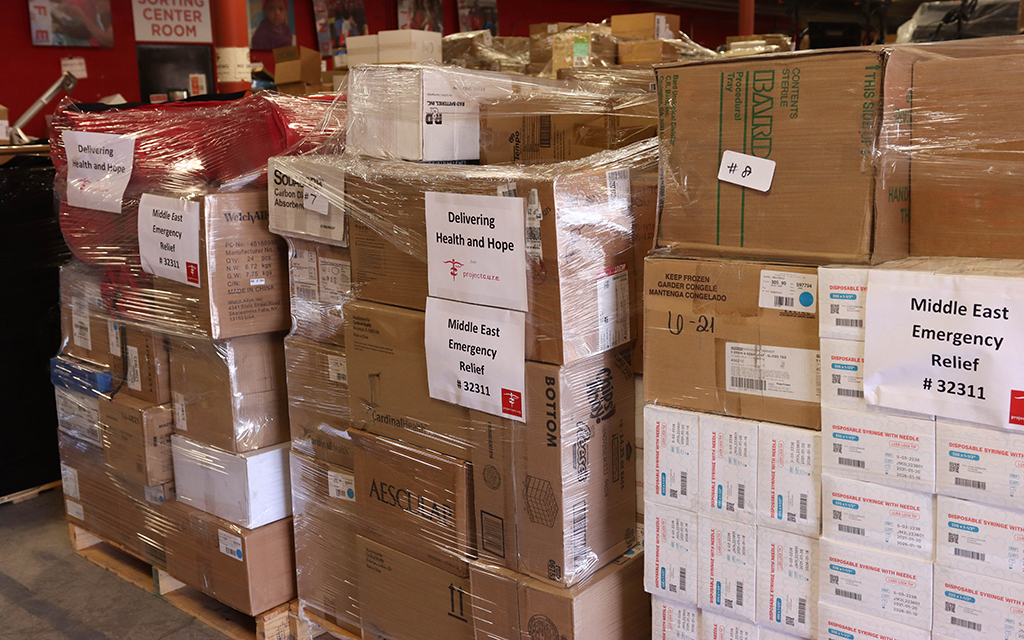
Pallets of medical supplies sit inside the Project C.U.R.E. distribution center in Tempe on Fri. Oct. 20, waiting to be sent to the Middle East to help civilians amid the Israel-Hamas war. (Photo by Angelina Steel/Cronkite News)
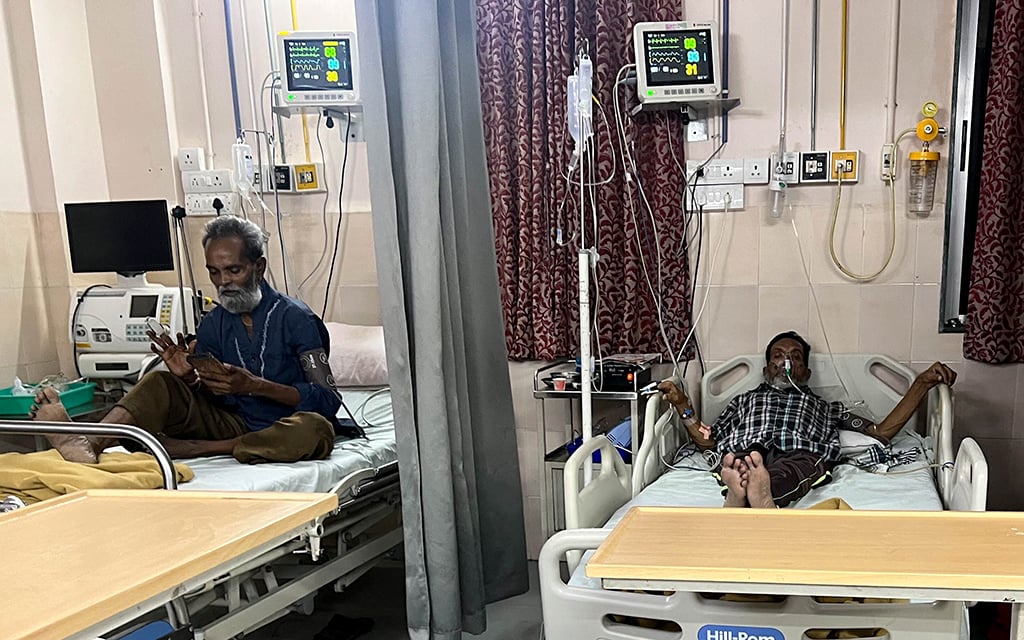
Donated medical supplies from Project C.U.R.E. Phoenix in use in India. (Photo courtesy of Project C.U.R.E.)
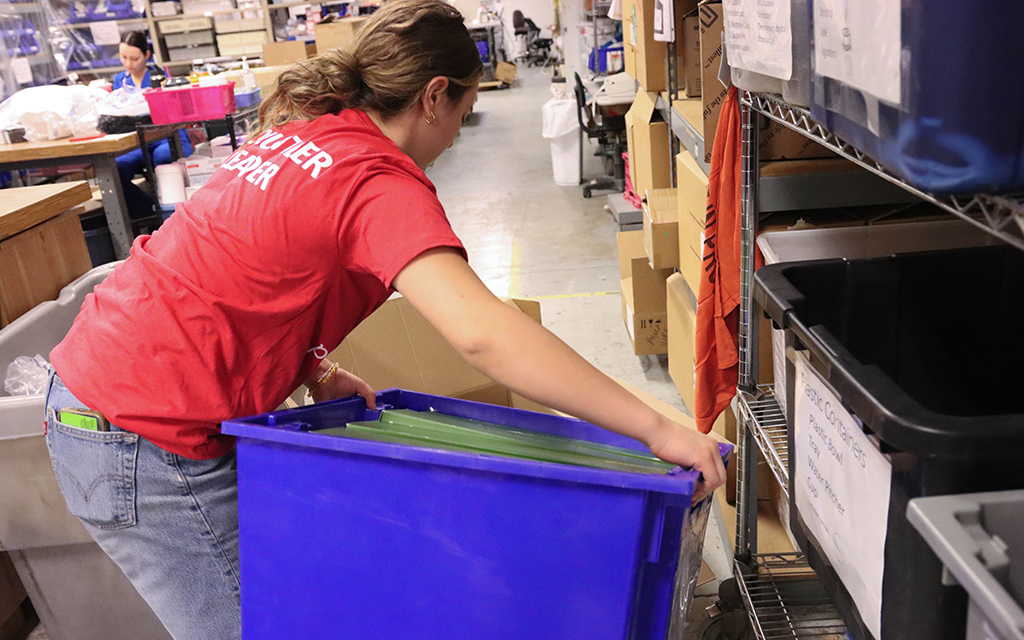
Project C.U.R.E. volunteer and ASU student Mia Copeland moving donations around to create more storage space for medical relief supplies on Fri. Oct. 20, in Tempe. (Photo by Angelina Steel/Cronkite News)
TEMPE – Millions of dollars worth of medical supplies sit tucked away in a warehouse on W. 14th Street in Tempe. Among them are eight large pallets filled with medical relief supplies waiting to be shipped to the Middle East.
This warehouse is the Phoenix distribution center for Project C.U.R.E., an organization that was founded in 1987 in Colorado to address the staggering shortage of medical resources around the world. Its most recent project: sending medical supplies that could provide emergency relief to civilians in the middle of the Israeli-Hamas conflict.
Sun Houdeshell, the director of operations at the Phoenix location, says she wants to help as many civilians affected by the war as possible, Israeli or Palestinian.
“We’re not a political organization. We want to help everybody,” Houdeshell said. “Where you were born shouldn’t affect whether you live or die. Just because you were born in Africa, just because you were born in Gaza doesn’t mean you shouldn’t get treatment. I believe health care is a human right.”
She and the Project C.U.R.E volunteers started their latest project on Monday, Oct. 16; they have no idea when it’s going to end.
Usually, the organization ships medical supplies overseas on a boat. It typically takes three to six months for supplies to reach their destination, which could be anywhere from Panama to India, Turkey or, more frequently, Africa. Since the Middle East conflict is an immediate emergency, Houdeshell says they’re relying on commercial aircraft, which presents several challenges.
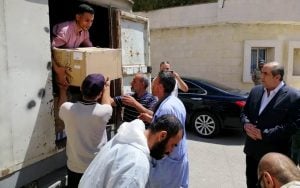
Trucks of donated medical supplies that were distributed by Project C.U.R.E. Phoenix are being distributed for use in Syria. (Photo courtesy of Project C.U.R.E.)
She says they had to redo the pallets of medical supplies multiple times because of current aircraft space and regulations.
“At first they wanted 10 pallets. But they said no, we can only fit eight. So we break down and build again because we want to send as much relief as possible,” Houdeshell said. “Then they say there’s a regulation that the pallet has to be perfect. So we break it down and redo the perfect shape.”
Houdeshell is patiently waiting for a call from an airline that has found room on a flight for the supplies. She says this could come at any moment.
“It could be any day. I have no idea. It could be today. They could ask me Sunday to come in and ship it out. Or it could stay there like a month. Nobody knows at this point.”
Doctors Without Borders, a nonprofit organization that delivers emergency medical aid to people in crisis in more than 70 countries, has recently published statements saying its activities in Gaza are currently limited.
“Insecurity and unpredictable bombardments have made it extremely difficult to deliver aid and provide health care,” a statement on the organization’s official website stated. “MSF is preparing medical and humanitarian supplies to be sent to Gaza as soon as safe access is guaranteed. We will also send emergency teams, if the protection of humanitarian and health workers can be ensured. .”
President Joe Biden posted a public statement on Oct. 21 that the first convoy of humanitarian assistance had crossed the border into Gaza to help civilians in need.
“The United States remains committed to ensuring that civilians in Gaza will continue to have access to food, water, medical care, and other assistance, without diversion by Hamas,” the press release said. “We will continue to work with all parties to keep the Rafah crossing in operation to enable the continued movement of aid that is imperative to the welfare of the people of Gaza.”
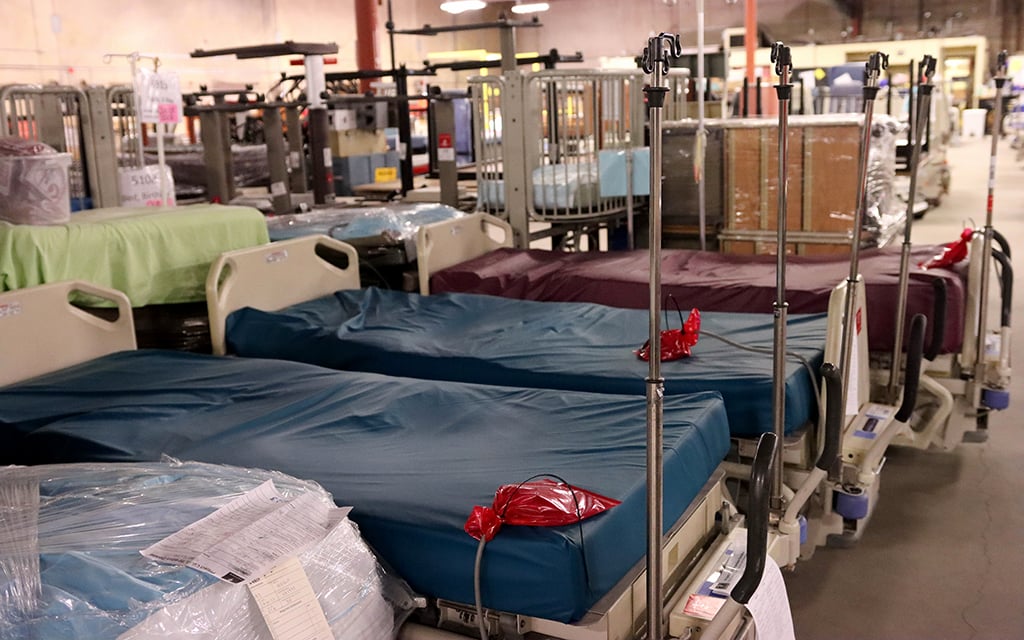
Donated hospital beds sit on the second floor of the Project C.U.R.E. distribution center in Tempe on Fri. Oct. 20, The beds will eventually be sent to different countries for medical relief. (Photo by Angelina Steel/Cronkite News)
Houdeshell is hoping now that the Egypt-Gaza border will remain open for humanitarian relief and provide a reliable pathway for supplies to reach the people in Gaza.
This isn’t the first time Houdeshell has dealt with emergency crisis relief. The organization also sent aid to Ukraine when the Russian invasion started in 2022, the same year that Houdeshell joined the organization. She says it was one of her proudest moments since joining Project C.U.R.E.
“We had this baby crib upstairs, made out of metal and it looks like a cage… the recipient sent us a video of this pediatric unit with this cage-looking crib that I would always make fun of. And they looked so happy,” Houdeshell said. “In the video you can tell how grateful they are to have the equipment. Equipment that I had been making fun of the whole time.”
The two-story warehouse is separated into different sections for medical supplies. Large equipment, such as intensive-care unit beds and electric wheelchairs, is kept in an upstairs area. The downstairs area is where they keep biomedical equipment, surgical instruments and pallets ready for shipment.
“We have enough equipment here to build a hospital. Maybe even two,” Houdeshall said.
Volunteers pick up medical supplies from donors, usually hospitals or community centers, then deliver everything to the warehouse. From there, volunteers unload the supplies, sort through and organize them, mark them in their inventory and label the items based on which country they will go to. Some equipment needs maintenance before it’s sent out; a team of engineers is available to come in and fix it.
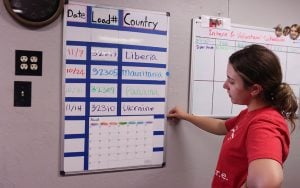
Project C.U.R.E. volunteer and ASU student Mia Copeland, at work at the distribution center in Tempe on Fri., Oct. 20, explains the schedule of when medical aid will be sent to designated countries. Israel isn’t included on the schedule because it’s last-minute emergency medical relief. (Photo by Angelina Steel/Cronkite News)
Houdeshell oversees it all, with the help of four Arizona State University interns. She says that’s not enough for all of the work they do and she wishes she had more help.
“Right now I have four (interns) and I have room for up to 10,” Houdeshell says. “I want to encourage college students, especially those in pre-health, you need to see this and feel this so when you go to medical school or become a health care professional you will know the importance of this.”
Mia Copeland, an intern at Project C.U.R.E. and sophomore at ASU studying molecular biology, says she’s been with the organization for over a year.
“What’s crazy is I feel like I’m in it. This is a real-time emergency and I feel like we’re in it doing something to help those who need it.”
Copeland says interning at Project C.U.R.E. has made her reflect on the amount of medical waste coming out of America.
“Hospitals aren’t giving this to us out of the goodness of their heart. Everything here would have been in the trash,” Copeland says. “One piece of equipment would charge your insurance thousands of dollars … and all this can be repurposed towards countries where there is so much need out there. So why are we throwing it out?”

